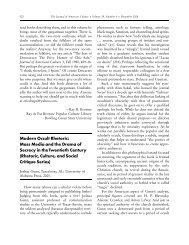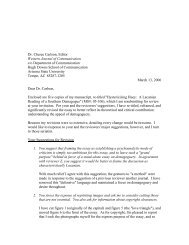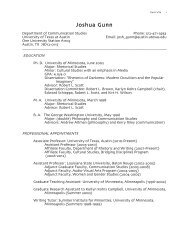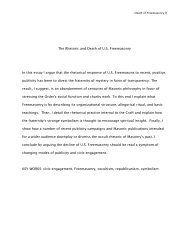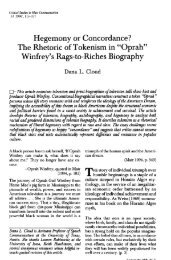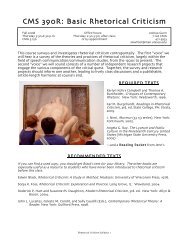On Viewing Rhetoric As Epistemic: Ten Years Later.
On Viewing Rhetoric As Epistemic: Ten Years Later.
On Viewing Rhetoric As Epistemic: Ten Years Later.
Create successful ePaper yourself
Turn your PDF publications into a flip-book with our unique Google optimized e-Paper software.
,.:.-:<br />
cognizing one's traditions as such, recognizing<br />
that traditions need to be lived to be<br />
traditions, and, further, teaching one tbat<br />
one's traditions are only traditions.<br />
Ironically enough, one inteqpretation.of<br />
relativism rather than casting individuals<br />
a&ift in a standard-Iess world, fixes tleo<br />
in a strict determinism. This sort of relativism,<br />
often called "historicism," emphasizei<br />
the immediacy of one's own history and that<br />
of one's particular culture. 'We are what we<br />
are because of what our forebears have been;<br />
s'e act as we must given the expectancies our<br />
particular lives have endowed us with and in<br />
accordance with the limits of our societal<br />
noffns. Other persons and other societies<br />
differ from us because of their cultural<br />
deterrninants. \ro culture can claim anv rational<br />
priority and any contest of interests<br />
mtut be settled by s'hatever tests of sheer<br />
strength t}at may be brought to bear in<br />
the circumstances.<br />
<strong>On</strong>e need not deny historical detern:inism.<br />
<strong>On</strong>e only need to denl', and I have tried<br />
consistently to do so, the rigidity of sudr<br />
determinations. Shifts in cuhural consciousness,<br />
both revolutionary and evolutionary,<br />
seem consistently present in human experieoce.<br />
Furthermore, n'hat q'e call "a culture"<br />
or "a society" is marked only rnore-or-less<br />
distinctly; or, to put the matter a little differentll',<br />
there are rnembranes that bound the<br />
circumferences of such bodies, but these<br />
membranes are permeable.<br />
lr{y suggesting that there are tq'o dimensions<br />
of relativism-that among societies and<br />
that s'ithin a socieg'-probably has not relieved<br />
the tension felt by those q'ho use the<br />
word as a pejorative or who fear being so<br />
labelled. And there is a third dimension.<br />
Even those u'ho take the position that<br />
there rnust be some unifed hierarcJry of<br />
stable standards in order to achieve decent<br />
individual and social liles s'ill agree that<br />
such standards must be applied in specific<br />
sets of circumstances. few w;ll argue that in<br />
practice, at least, applications are seldonr, if<br />
RHETORIC AS EPISTEMIC 265<br />
ever, possible in such a way that the standards<br />
are engaged without discornfort Somi:<br />
degree of discomfort seems inevitable in the<br />
very necessity of having to make a judgment<br />
Tlri existence of some set of circunstances in<br />
the guise of a case to be settled seerns to<br />
suggest rather strongly the human participatioa<br />
of relating standards to partianlar, concrete<br />
events. Of coiuse one might say wishfully<br />
that if we possessed knowledge of the<br />
propet sort then no sudr cases would arise<br />
for the judgment of sorne parts of society<br />
by other parts. The dialogue in Plato's<br />
Gorgias is actuated to a rnajor degree around<br />
the proposition attributed to Socrates that<br />
the wrongdoer should prefer punishrnent to<br />
escaping punishment. I call that argument<br />
q'ishful since it may be interpreted as relieving<br />
members of a society of the burden of<br />
making judgments of others. That burden<br />
is particularly beary if one is convinced of<br />
the contiogen cy of any judgment.<br />
, None of the foregoing is intended to<br />
deprecate self-criticism. Rather I hold that<br />
a community to sustain itseif, both through<br />
reafirmation and reform, must be forrned<br />
of rnernbers r*'ho n'iil take the responsibiliiy<br />
of examining critically the binding forces,<br />
the norms, of the community and of recognizing<br />
that the traditjons accepted and extended<br />
eotail living consistently with the<br />
social demands. The task is not lightened by<br />
recognizing that social demands can be repressive.<br />
<strong>On</strong> the other hand, as important as<br />
self-criticism may be, we should also recognize<br />
that a community may impose its dernands<br />
quite invidiously by insisting on<br />
self-criticism as an instrurnent of social conformity.<br />
<strong>Rhetoric</strong>al relativism is not an easy process<br />
promising dependable outcomes. It may be<br />
just as well that the very label tends to make<br />
us fearful, for that emotion may be an indication<br />
of reluctance to impose solutions<br />
rather than to create and share them jointly.<br />
The attitude suggested is that appropriate to<br />
talting the responsibility of persuading others<br />
1^?



